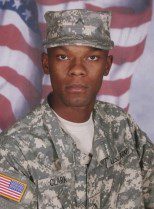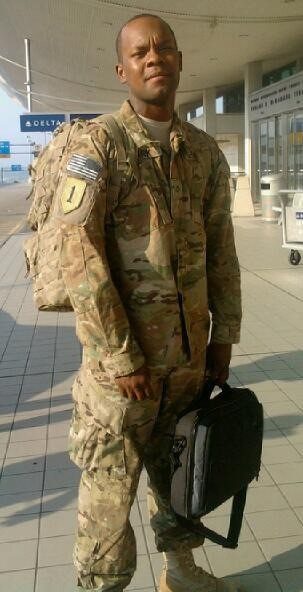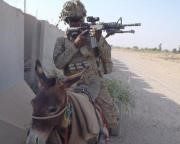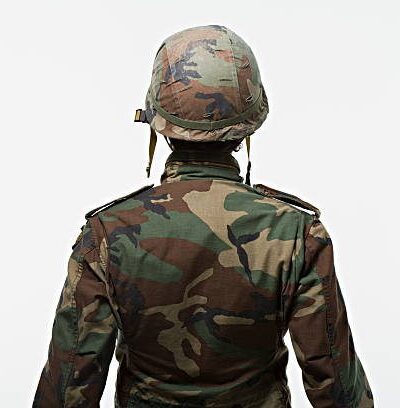
Chazray C. Clark
Specialist, United States Army
March 2, 1987 – September 18, 2011
Age – 24
Lincoln Park, MI
Operation Enduring Freedom
4th Squadron, 4th Cavalry Regiment, 1st Heavy Brigade Combat Team, 1st Infantry Division, Fort Riley, KS
Died of injuries suffered when insurgents attacked his unit with an improvised explosive device
A journalist witnessed the event involving Specialist Clark. Following is the journalist’s story and after is a letter from his mother.
It is 4:45a.m. A young American soldier has just triggered an improvised explosive device while on nighttime patrol in Helmand Province, Afghanistan.
The event was witnessed by a journalist who recorded what follows on video tape as medical aid was requested by the soldier’s commanding officer.
SPC Chazray Clark’s fellow soldiers put tourniquets on what remained of his lower left and right legs and left forearm and tell him he going to be fine. Although he is in great pain, SPC Clark stays awake while waiting for his MEDEVAC flight.
Clark’s commanding officer, Lt. Colonel Mike Katona is confident that despite Clark’s grievous wounds he will survive. The radio call for help goes out within minutes of the explosion, informing his command and the medical units of the need for a MEDEVAC airlift for SPC Clark.
Just out of sight is the unit’s home at Forward Operating Base (FOB) Pasab a mere mile and a half away – just three minutes flying time. Not 500 feet away from SPC Clark’s tent in the FOB, a MEDEVAC helicopter sits on a pad surrounded by protective T-Walls waiting to respond to just such a call for help. Once picked up, SPC Clark will be transported within 10 minutes to one of the finest, most experienced trauma facilities on the planet – the ISAF Medical Treatment Facility at Kandahar Airfield.
Tick. Tick. Tick. As the minutes passed SPC Clark asks for painkillers. The Lt. Colonel asks the radioman to reconfirm that the request had been received and acknowledged. It has been and assurances are received over the radio that the helicopter is “wheels up” speeding their way. The Lt. Colonel remarks how this is not the first time they have experienced a significant delay in getting a MEDEVAC flight. By now SPC Clark has been moved to an improvised landing zone in a farmer’s field. Security positions have been set-up around the field, and the night remains quiet.
But no helicopter is on its way. The nearby MEDEVAC helicopter is still awaiting orders to lift-off. The unit directing the operation is still searching for a helicopter gunship that can fly escort for the unarmed MEDEVAC which bears bright red crosses on white backgrounds on every flat surface. What the Lt. Colonel is not told is that despite twenty minutes of searching no escort helicopter has been found. Every attack helicopter in the air is busy supporting ground troops elsewhere and cannot be diverted to provide protection for this MEDEVAC mission.
At long last orders are given to warm up and launch an attack helicopter sitting on the pad at Kandahar Air Field to fly the 25 miles to FOB Pasab and escort the waiting MEDEVAC helicopter.
The MEDEVAC helicopter finally lifts off at 5:24a.m. It has been 34 minutes since the call for help was transmitted. Despite the LZ being just 3 minutes away, the flight from FOB Pasab takes a full 13 minutes to complete as the two helicopters coordinate their flights. By 5:39a.m. the MEDEVAC helicopter is airborne once again, speeding Chazray Clark to Kandahar Air Field medical facility.
At 5:49a.m. SPC Chazray Clark touches down and is transferred to the care of the ground medical team. A few minutes later Chazray Clark is pronounced dead.
This was how Chazray Clark spent the last hour of his life. Knowing that 92% of the soldiers wounded in Afghanistan survive their wounds, he must have been hopeful that he too would survive. But that confidence must have ebbed away as seconds turned into minutes and minutes turned into an hour as he lay in that farmer’s field in the dark of night in a distant corner of Afghanistan.
Everyone involved did exactly what they were trained to do and were expected to do by policy and regulation. No person or persons in Afghanistan was responsible for the way SPC Clark’s life ended. What this web site shows, however, is that the very U.S. Army MEDEVAC policies and procedures being followed conspired to significantly delay getting SPC Clark to possibly lifesaving medical treatment of the first order.
No one will ever know if Chazray Clark would have survived his wounds, although many American soldiers have survived multiple amputations and survived. Most people will agree that if he had been rescued faster and placed into the hands of trauma surgeons 15-30-45 minutes sooner, his chances would have been better.
This web site identifies changes in policy and procedures that can improve the efficiency of the MEDEVAC system in use by the U.S. Army.
The letter from Chazray’s Mother:
U.S. Army Evacuation Policy Change Request Letter from the Mother of a fallen soldier:
Hello to all American Citizens at home and abroad. My name is Keyko Clark-Davis and I am a military parent whose first-born son, Army SPC Chazray Clark was killed in Kandahar, Afghanistan on 18 Sept 2011.
The fact that my son decided to risk his own life to protect the basic freedoms so many of us take for granted makes me extremely proud in spite of the devastation and sadness that his untimely death has caused us as a family. Chazray was only 24 years old. He and I had a long discussion prior to his decision to enlist; and like the majority of mothers, I reluctantly agreed and reassured him that I supported his decision 100%. I even went with him to be sworn in after signing up.
I am having a very difficult time dealing with his death and as are his four siblings. Although this is not the sole content of our conversations, my maternal instincts causes me to feel their pain; just as they can feel mine even in the absence of words. My difficulty in coping is compounded by the fact that the US Army has failed to provide me with honest, full disclosure of ALL the facts that caused the death of my son. Although not the official next–of-kin on behalf of my daughter-in-law I have requested a complete copy of the Army investigation, autopsy reports, photos, etc., which at the time of this letter I have not yet received.
Thus, after several failed attempts to obtain honest official answers to my many questions from the US Army, I began conducting my own research into the circumstances surrounding my son’s death. My grief began to give way to anger when I viewed video footage shot by a reporter named Mr. Michael Yon, who was there at the time my son was injured. Casualty Assistance Officers advised us initially to not believe possible rumors or media propaganda which we might be exposed to prior to us having any knowledge of Mr. Yon. When I thought about that, it actually raised even more unresolved questions with regard to the US Army’s “Golden Hour” and “9-line” evacuation policies involving rescue missions. Mr. Yon’s footage makes him an eyewitness to what happened to my son, and not just a media person spreading rumors.
It has come to my attention that there was a PEDRO that was operational and could have responded to the 9-line call the day my son was injured; thereby alleviating the 59 minutes that my son had to wait for a MEDEVAC. However, due to policies and/or politics within the US Army with respect to other branches operating under CENTCOM the MEDEVAC was delayed.
The loss of my son has become the most life-altering event that my entire family has ever experienced. I feel that the United States Army, has an obligation to every soldier, every family and every US citizen to re-evaluate current protocol and implement WHATEVER CHANGES are needed to save the lives of wounded soldiers by whatever means necessary.
The Army’s contention that they are following protocol of the Geneva Convention is fallacious and without substance. Not only are the Taliban not signatories to the Geneva Convention but the Geneva Convention does not mandate that a MEDEVAC transport identify itself with a Red Cross.
I do not want another family to feel excruciating pain and suffering from the devastating loss of a loved one while policy makers and high ranking officers continue to turn a blind eye to the inherent failures in existing policies. With vivid images of my son’s final moments of life FOREVER BURNED into my mind, closure can only be made possible by doing everything in my power to bring about these much needed changes in current policy.
In the name of my fallen hero, SPC Chazray Clark, I am making a personal appeal to ALL United States Citizens who enjoy the freedoms for which he unselfishly gave his life, to join me in this crusade to bring about an immediate change to an Army Policy that requires alerting the enemy the MEDEVACs are unarmed.
God bless you all and thanks in advance for your prayers and support.
Respectfully,
Keyko Clark-Davis


